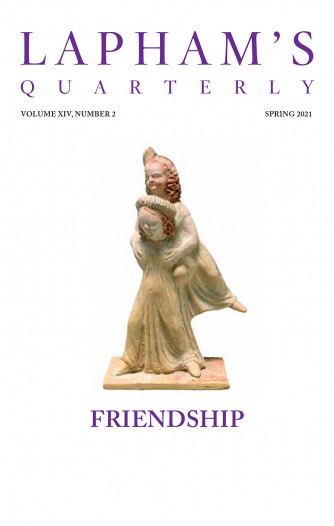I’ve got some shit I’m conservative about and some shit I’m liberal about. Crime—I’m conservative. Prostitution—I’m liberal.
—Chris Rock, 2008Forestalling a Mutiny
Herman Melville among the pirates.
The three officers—as partially liberated from some inward constraint associated with Billy’s mere presence—simultaneously stirred in their seats. They exchanged looks of troubled indecision, yet feeling that decide they must and without long delay. For Captain Vere, he for the time stood unconsciously with his back toward them, apparently in one of his absent fits, gazing out from a sashed porthole to windward upon the monotonous blank of the twilight sea.
But the court’s silence continuing, broken only at moments by brief consultations, in low earnest tones—this served to arouse him and energize him. Turning, he to-and-fro paced the cabin athwart; in the returning ascent to windward climbing the slant deck in the ship’s lee roll, without knowing it symbolizing thus in his action a mind resolute to surmount difficulties—even if against primitive instincts strong as the wind and the sea. Presently he came to a stand before the three. After scanning their faces, he stood less as mustering his thoughts for expression than as one inly deliberating how best to put them to well-meaning men not intellectually mature, men with whom it was necessary to demonstrate certain principles that were axioms to himself. Similar impatience as to talking is perhaps one reason that deters some minds from addressing any popular assemblies.
When speak he did, something both in the substance of what he said and his manner of saying it showed the influence of unshared studies modifying and tempering the practical training of an active career. This, along with his phraseology, now and then was suggestive of the grounds whereon rested that imputation of a certain pedantry socially alleged against him by certain naval men of wholly practical cast, captains who nevertheless would frankly concede that His Majesty’s navy mustered no more efficient officer of their grade than Starry Vere.
What he said was to this effect: “Hitherto I have been but the witness, little more. And I should hardly think now to take another tone, that of your coadjutor for the time, did I not perceive in you—at the crisis too—a troubled hesitancy, proceeding, I doubt not, from the clash of military duty with moral scruple—scruple vitalized by compassion. For the compassion, how can I otherwise than share it? But, mindful of paramount obligations, I strive against scruples that may tend to enervate decision. Not, gentlemen, that I hide from myself that the case is an exceptional one. Speculatively regarded, it well might be referred to a jury of casuists. But for us here, acting not as casuists or moralists, it is a case practical, and under martial law practically to be dealt with.

Story of Nastagio degli Onesti, second panel, by Sandro Botticelli, 1483, based on Boccaccio’s Decameron. Prado Museum, Madrid, Spain.
“But your scruples: Do they move as in a dusk? Challenge them. Make them advance and declare themselves. Come now—do they import something like this: If, mindless of palliating circumstances, we are bound to regard the death of the master-at-arms as the prisoner’s deed, then does that deed constitute
a capital crime whereof the penalty is a mortal one? But in natural justice is nothing but the prisoner’s overt act to be considered? How can we adjudge to summary and shameful death a fellow creature innocent before God and whom we feel to be so? Does that state it aright? You sign sad assent. Well, I, too, feel that—the full force of that. It is Nature. But do these buttons that we wear attest that our allegiance is to Nature? No, to the King. Though the ocean, which is inviolate Nature primeval, though this be the element where we move and have our being as sailors, yet as the King’s officers lies our duty in a sphere correspondingly natural? So little is that true, that in receiving our commissions we in the most important regards ceased to be natural free agents. When war is declared, are we the commissioned fighters previously consulted? We fight at command. If our judgments approve the war, that is but coincidence. So in other particulars. So now. For suppose condemnation to follow these present proceedings. Would it be so much we ourselves that would condemn as it would be martial law operating through us? For that law and the rigor of it, we are not responsible. Our vowed responsibility is in this: that however pitilessly that law may operate in any instances, we nevertheless adhere to it and administer it.
“But the exceptional in the matter moves the hearts within you. Even so too is mine moved. But let not warm hearts betray heads that should be cool. Ashore in a criminal case, will an upright judge allow himself off the bench to be waylaid by some tender kinswoman of the accused seeking to touch him with her tearful plea? Well, the heart here—sometimes the feminine in man—is as that piteous woman, and hard though it be, she must here be ruled out.”
He paused, earnestly studying them for a moment, then resumed.
“But something in your aspect seems to urge that it is not solely the heart that moves in you, but also the conscience, the private conscience. But tell me whether or not, occupying the position we do, private conscience should not yield to that imperial one formulated in the code under which alone we officially proceed?”
Here the three men moved in their seats, less convinced than agitated by the course of an argument troubling but the more the spontaneous conflict within.
Perceiving which, the speaker paused for a moment, then abruptly changing his tone, went on.
“To steady us a bit, let us recur to the facts. In wartime at sea a man-of-war’s man strikes his superior in grade, and the blow kills. Apart from its effect the blow itself is, according to the Articles of War, a capital crime. Furthermore—”
“Ay, sir,” emotionally broke in the officer of marines, “in one sense it was. But surely Budd purposed neither mutiny nor homicide.”
“Surely not, my good man. And before a court less arbitrary and more merciful than a martial one, that plea would largely extenuate. At the last assizes it shall acquit. But how here? We proceed under the law of the Mutiny Act. In feature no child can resemble his father more than that Act resembles in spirit the thing from which it derives: war. In His Majesty’s service—in this ship, indeed—there are Englishmen forced to fight for the King against their will. Against their conscience, for aught we know. Though as their fellow creatures some of us may appreciate their position, yet as navy officers what reck we of it? Still less recks the enemy. Our impressed men he would fain cut down in the same swath with our volunteers. As regards the enemy’s naval conscripts, some of whom may even share our own abhorrence of the regicidal French Directory, it is the same on our side. War looks but to the frontage, the appearance. And the Mutiny Act, War’s child, takes after the father. Budd’s intent or non-intent is nothing to the purpose.
“But while, put to it by those anxieties in you which I cannot but respect, I only repeat myself—while thus strangely we prolong proceedings that should be summary—the enemy may be sighted and an engagement result. We must do, and one of two things must we do: condemn or let go.”
“Can we not convict and yet mitigate the penalty?” asked the sailing master, here speaking, and falteringly, for the first.
“Gentlemen, were that clearly lawful for us under the circumstances, consider the consequences of such clemency. The people,” meaning the ship’s company, “have native sense; most of them are familiar with our naval usage and tradition—and how would they take it? Even could you explain to them—which our official position forbids—they, long molded by arbitrary discipline, have not that kind of intelligent responsiveness that might qualify them to comprehend and discriminate. No, to the people the foretopman’s deed, however it be worded in the announcement, will be plain homicide committed in a flagrant act of mutiny. What penalty for that should follow, they know. But it does not follow. Why? they will ruminate. You know what sailors are. Will they not revert to the recent outbreak at the Nore? Ay. They know the well-founded alarm, the panic it struck throughout England. Your clement sentence they would account pusillanimous. They would think that we flinch, that we are afraid of them—afraid of practicing a lawful rigor singularly demanded at this juncture, lest it should provoke new troubles. What shame to us such a conjecture on their part, and how deadly to discipline.You see them whither—prompted by duty and the law—steadfastly drive. But I beseech you, my friends, do not take me amiss. I feel as you do for this unfortunate boy. But did he know our hearts, I take him to be of that generous nature that he would feel even for us on whom in this military necessity so heavy a compulsion is laid.”
With that, crossing the deck, he resumed his place by the sashed porthole, tacitly leaving the three to come to a decision. On the cabin’s opposite side, the troubled court sat silent. Loyal lieges, plain and practical, though at bottom they dissented from some points Captain Vere had put to them, they were without the faculty, hardly had the inclination, to gainsay one whom they felt to be an earnest man, one too not less their superior in mind than in naval rank. But it is not improbable that even such of his words as were not without influence over them, less came home to them than his closing appeal to their instinct as sea officers: in the forethought he threw out as to the practical consequences to discipline, considering the unconfirmed tone of the fleet at the time, should a man-of-war’s man’s violent killing at sea of a superior in grade be allowed to pass for aught else than a capital crime demanding prompt infliction of the penalty.

Herman Melville
From Billy Budd. Novelist, short-story writer, and poet, Melville crewed a New York–Liverpool packet ship in 1839 at the age of eighteen, the first of his many adventures at sea. His later seafaring voyages in the 1840s furnished the setting for Moby Dick, which he wrote while working on a farm in Pittsfield, Massachusetts. The literary critics in Boston and New York pronounced the story of Ahab and the great white whale indecent, murderous, and insulting.
